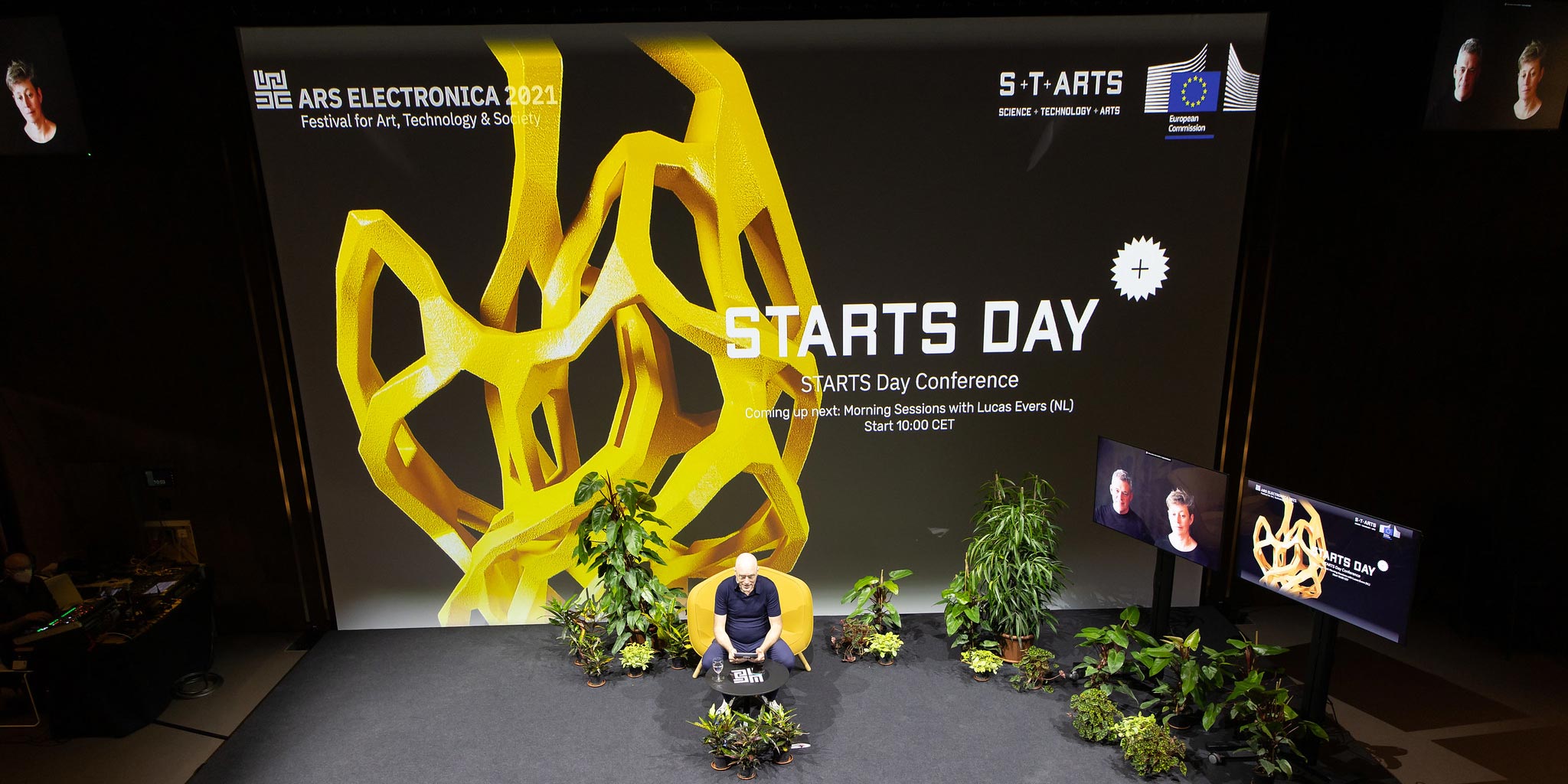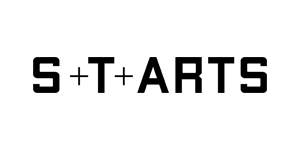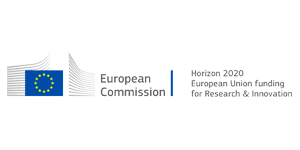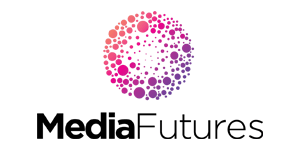STARTS Talk: In Conversation with Territorial Agency
Speakers: Territorial Agency – John Palmesino and Ann-Sofi Rönnskog (INT)
Moderation: Lucas Evers (NL)
As part of the STARTS initiative, the STARTS Prize awards the most pioneering results and collaborations in the field of creativity and innovation at the intersection of science, technology and the arts.
The STARTS Talks 2021 present the people behind the projects, their approaches and perspectives, their methods and the outstanding projects that resulted from these interdisciplinary collaborations.
In this session Lucas Evers and Territorial Agency (John Palmesino and Ann-Sofi Rönnskog) dive into Oceans In Transformation, this years Grand Prize for Artistic Exploration. Oceans in Transformation is a large scale artistic project that addresses the challenges linked to multi-scalar, multi-temporal and dynamic environmental data, and investigates the impact of human activities on our oceans through data visualization, exhibitions, workshops and capacity building programmes.
Data Deep Dive: On visualizing critical challenges
Speakers: Tactical Tech (INT), Territorial Agency (INT), Geocinema (INT)
Moderation: Mar Santamaría-Varas (ES)
With many of the current global challenges, rigorous analysis of data gathered through digital methods such as geospatial analysis, earth observation and cartography can bring about an understanding for how they affect the environment, society and individual humans as well as shine a light on possible solutions. Often, the information generated through these tools is too complex to digest for non-expert audiences. Artists, scientists, and architects are taking up this task and are applying various methods of data visualization and investigative data analysis in their work. By translating complex information and making it tangible through their artwork, prototypes, online platforms, workshops, and capacity building programmes they’re advocating for transparency and empowering their audiences to join in in the discussion. This keynote and roundtable discussion connects perspectives from architecture and research tackling a transparent and open approach to data in their work.
Creating with Data: From Arts to Entrepreneurship
Speakers: Julie Freeman (UK), Mariana Lanari (BR/NL), Obvious Collective (FR), David De Roure (UK), Helene Guillaume (UK/USA)
Moderation: Prof. Elena Simperl (UK)
Data has changed our lives in more than one way, from how we socialise online and run businesses to how we access public services and do science. It has been called the “raw material” of the digital age, fuelling creativity and innovation. And yet, its use has also raised challenges, including privacy, online polarisation, and digital inequality. This session will discuss some of these tensions with artists and entrepreneurs – artists have long used data to create new work, sometimes commenting on some of these challenges; businesses have valued the way it can inform decisions, despite concerns that it tends to promote incremental rather than disruptive innovation. The session is organised by MediaFutures, a three years initiative, co-funded through Horizon 2020, which delivers an accelerator and arts residency programme tackling the perils of mis- and disinformation online.
Timetable
All times are CET.
| 10:00 – 10:10 | Welcome to STARTS Day |
| 10:10 – 10:40 | STARTS Talk: In Conversation with Territorial Agency online & on-site |
| 10:40 – 11:00 | PAUSE |
| 11:00 – 12:30 | Data Deep Dive: On visualizing critical challenges online |
| 12:30 – 12:40 | PAUSE |
| 12:40 – 13:40 | Creating with Data: From Arts to Entrepreneurship online |
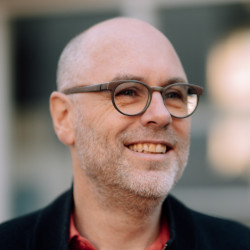 Lucas Evers (NL) is Head of Programme of the Make team at Waag and leading Waag’s Open Wet Lab. He is actively involved in several projects that concern the interactions between the arts and sciences, arts and ethics and the arts and innovation in contemporary makers culture. With the Make group he researches societal and ecological matters through hardware, production processes and materials.The Open Wet Lab is a laboratory where arts, sciences, engineering and the public meet to research biotechnologies and their impact in the context of society and ecology.
Lucas Evers (NL) is Head of Programme of the Make team at Waag and leading Waag’s Open Wet Lab. He is actively involved in several projects that concern the interactions between the arts and sciences, arts and ethics and the arts and innovation in contemporary makers culture. With the Make group he researches societal and ecological matters through hardware, production processes and materials.The Open Wet Lab is a laboratory where arts, sciences, engineering and the public meet to research biotechnologies and their impact in the context of society and ecology.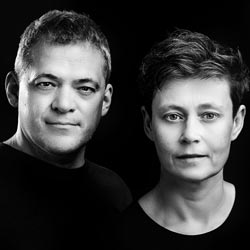 Territorial Agency—John Palmesino and Ann-Sofi Rönnskog (INT): Territorial Agency is a London-based independent organization that combines contemporary architecture, science, art, advocacy, and action, based on comprehensive spatial analysis and the formation of new settings for public diplomacy. Recent projects include Oceans in Transformation commissioned by TBA21¬–Academy, in collaboration with ZKM Critical Zones and Taipei Biennial 20; Museum of Oil with Greenpeace, ZKM Reset Modernity and Chicago Architecture Biennial; Anthropocene Observatory with Armin Linke and Anselm Franke at HKW Haus der Kulturen der Welt Berlin, BAK Utrecht and in the collection of Centraal Museum Utrecht; Plan the Planet with AA Architectural Association supported by Graham Foundation; North anon in Kiruna Forever at ArkDes; the Museum of Infrastructural Unconscious; and the integrated plan for the Zuiderzee region, Unfinishable Markermeer. John Palmesino (ITA) and Ann-Sofi Rönnskog (FIN) teach at the AA Architectural Association School of Architecture, London.
Territorial Agency—John Palmesino and Ann-Sofi Rönnskog (INT): Territorial Agency is a London-based independent organization that combines contemporary architecture, science, art, advocacy, and action, based on comprehensive spatial analysis and the formation of new settings for public diplomacy. Recent projects include Oceans in Transformation commissioned by TBA21¬–Academy, in collaboration with ZKM Critical Zones and Taipei Biennial 20; Museum of Oil with Greenpeace, ZKM Reset Modernity and Chicago Architecture Biennial; Anthropocene Observatory with Armin Linke and Anselm Franke at HKW Haus der Kulturen der Welt Berlin, BAK Utrecht and in the collection of Centraal Museum Utrecht; Plan the Planet with AA Architectural Association supported by Graham Foundation; North anon in Kiruna Forever at ArkDes; the Museum of Infrastructural Unconscious; and the integrated plan for the Zuiderzee region, Unfinishable Markermeer. John Palmesino (ITA) and Ann-Sofi Rönnskog (FIN) teach at the AA Architectural Association School of Architecture, London. 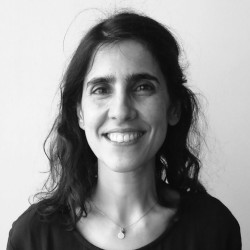 Mar Santamaría-Varas (ES) is the co-founder of 300.000 Km/s, an urban planning agency that explores the potentials of big data and new computing paradigms to improve urban analysis, strategic planning and decision-making.Her pioneering work in the field of urbanism has been recognized for its innovative quality and its impact on social transformation by the S+T+ARTS Prize (2019) and the Premio de Urbanismo Español. Her work has been exhibited at international cultural institutions, including the Venice Architecture Biennale (2021, 2016), BOZAR Bruxelles (2020), the Festival Ars Electronica (2019) and the Chicago Arts Institute (2015), among others. She has taught classes and given lectures at prestigious academic institutions across Europe; at present, she is visiting lecturer at EPFL Lausanne.
Mar Santamaría-Varas (ES) is the co-founder of 300.000 Km/s, an urban planning agency that explores the potentials of big data and new computing paradigms to improve urban analysis, strategic planning and decision-making.Her pioneering work in the field of urbanism has been recognized for its innovative quality and its impact on social transformation by the S+T+ARTS Prize (2019) and the Premio de Urbanismo Español. Her work has been exhibited at international cultural institutions, including the Venice Architecture Biennale (2021, 2016), BOZAR Bruxelles (2020), the Festival Ars Electronica (2019) and the Chicago Arts Institute (2015), among others. She has taught classes and given lectures at prestigious academic institutions across Europe; at present, she is visiting lecturer at EPFL Lausanne.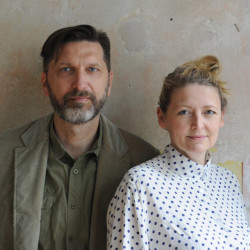 Stephanie Hankey (UK) and Marek Tuszynski (PL) investigate the impact of technology on society and its relationship to social, environmental, and political issues. They have been working together producing creative interventions for the past 20 years – exhibitions, art works, films, events, workshops and writing – using the best way possible to tell stories, influence attitudes, and find new ways of seeing. They are the cofounders of ‘Tactical Tech’, the co-curators of ‘Nervous Systems: Quantified Life and the Social Question,’ and the award winning touring exhibition, ‘The Glass Room,’ a museum and street-based art installation presented in Berlin, London, New York, and San Francisco, now transformed into a successful pop-up touring exhibition.
Stephanie Hankey (UK) and Marek Tuszynski (PL) investigate the impact of technology on society and its relationship to social, environmental, and political issues. They have been working together producing creative interventions for the past 20 years – exhibitions, art works, films, events, workshops and writing – using the best way possible to tell stories, influence attitudes, and find new ways of seeing. They are the cofounders of ‘Tactical Tech’, the co-curators of ‘Nervous Systems: Quantified Life and the Social Question,’ and the award winning touring exhibition, ‘The Glass Room,’ a museum and street-based art installation presented in Berlin, London, New York, and San Francisco, now transformed into a successful pop-up touring exhibition.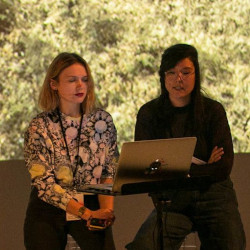 Geocinema (Solveig Qu Suess, Asia Bazdyrieva) (INT) is a collective that explores the possibilities of a “planetary” notion of cinema. Their practice has been concerned with the understanding and sensing of the earth while being on the ground, enmeshed within vastly distributed processes of image and meaning making. Their work has been shown internationally, including the solo show Making of Earths (Kunsthall Trondheim). In 2020 they were nominated for the Schering Stiftung Award for Artistic Research.
Geocinema (Solveig Qu Suess, Asia Bazdyrieva) (INT) is a collective that explores the possibilities of a “planetary” notion of cinema. Their practice has been concerned with the understanding and sensing of the earth while being on the ground, enmeshed within vastly distributed processes of image and meaning making. Their work has been shown internationally, including the solo show Making of Earths (Kunsthall Trondheim). In 2020 they were nominated for the Schering Stiftung Award for Artistic Research. 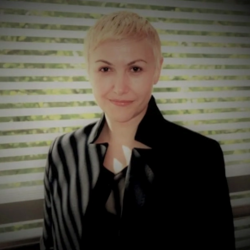 Elena Simperl (UK) is professor of computer science at King’s College London, a Fellow of the British Computer Society and former Turing fellow. According to AMiner, she is in the top 100 most influential scholars in knowledge engineering of the last decade, as well as in the Women in AI 2000 ranking. Before joining King’s, she held positions at Southampton, as well as in Germany and Austria. She has contributed to more than 30 research projects, often as principal investigator, or project lead. She is the PI of H2020 ACTION, where she develops human-AI methods to make participatory science thrive, and the scientific lead of H2020 MediaFutures, which uses approaches inspired by arts and open innovation to tackle online misinformation in science, health, and the environment. Elena authored more than 200 peer-reviewed publications in knowledge engineering, web semantics, open and linked data, social computing, crowdsourcing, and human data interaction. Her work has been featured in The Guardian and Computer Weekly and received awards from the European Innovation Radar and the Big Data Value Association, which brings together Europe’s major AI industry players.
Elena Simperl (UK) is professor of computer science at King’s College London, a Fellow of the British Computer Society and former Turing fellow. According to AMiner, she is in the top 100 most influential scholars in knowledge engineering of the last decade, as well as in the Women in AI 2000 ranking. Before joining King’s, she held positions at Southampton, as well as in Germany and Austria. She has contributed to more than 30 research projects, often as principal investigator, or project lead. She is the PI of H2020 ACTION, where she develops human-AI methods to make participatory science thrive, and the scientific lead of H2020 MediaFutures, which uses approaches inspired by arts and open innovation to tackle online misinformation in science, health, and the environment. Elena authored more than 200 peer-reviewed publications in knowledge engineering, web semantics, open and linked data, social computing, crowdsourcing, and human data interaction. Her work has been featured in The Guardian and Computer Weekly and received awards from the European Innovation Radar and the Big Data Value Association, which brings together Europe’s major AI industry players.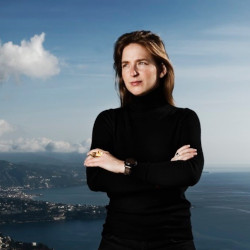 Helene Guillaume (UK/USA) is the founder and CEO of WILD.AI. She studied mathematics and financial risks, was a quant in a hedge fund and management consultant to Fortune500 companies in AI. She was a rugby player; she’s an ultra-marathon runner, triathlete, surfer, skier, and ice-swimmer. She comes from a family of artists and art collectors, which makes this topic close to her heart. Her favorite combined skillset is vitality+brains.
Helene Guillaume (UK/USA) is the founder and CEO of WILD.AI. She studied mathematics and financial risks, was a quant in a hedge fund and management consultant to Fortune500 companies in AI. She was a rugby player; she’s an ultra-marathon runner, triathlete, surfer, skier, and ice-swimmer. She comes from a family of artists and art collectors, which makes this topic close to her heart. Her favorite combined skillset is vitality+brains.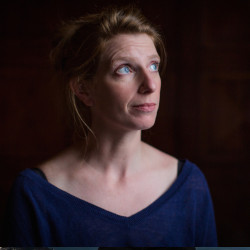 Through her practice Julie Freeman (UK) translates complex processes and data from natural sources into kinetic sculptures, physical objects, images, sound compositions and animations. Her work explores relationship between science and the natural world; questioning the use of technology in how we translate nature. Her focus is the investigation of data as an art material using it to create work which reflects the human condition through the analysis and representation of live data, data from living systems. Her background and training is an equal mix of computer scientist and artist, for her they are a single discipline. In 2012 she established the Open Data Institute‘s Data as Culture art programme (now directed by Hannah Redler Hawes), and is a co-founder of Fine Acts. She has a PhD from the School of Electronic Engineering and Computer Science at Queen Mary University of London, awarded for a thesis titles Defining Data as an Art Material.
Through her practice Julie Freeman (UK) translates complex processes and data from natural sources into kinetic sculptures, physical objects, images, sound compositions and animations. Her work explores relationship between science and the natural world; questioning the use of technology in how we translate nature. Her focus is the investigation of data as an art material using it to create work which reflects the human condition through the analysis and representation of live data, data from living systems. Her background and training is an equal mix of computer scientist and artist, for her they are a single discipline. In 2012 she established the Open Data Institute‘s Data as Culture art programme (now directed by Hannah Redler Hawes), and is a co-founder of Fine Acts. She has a PhD from the School of Electronic Engineering and Computer Science at Queen Mary University of London, awarded for a thesis titles Defining Data as an Art Material. 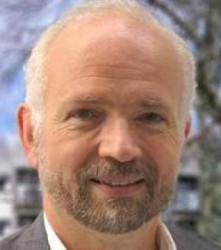 David De Roure (UK) is Professor of e-Research in the Engineering Science Department at the University of Oxford, and a Turing Fellow at The Alan Turing Institute. Throughout his career David has investigated emerging technologies in large scale distributed and sociotechnical systems, with a broad interest in society, technology and creativity, while also focusing on innovation in the process of scholarship. He has co-founded three interdisciplinary initiatives: the PETRAS National Centre of Excellence for IoT Systems Cybersecurity, which is the world’s largest socio-technical research centre focused on the future implementation of the Internet of Things; the Software Sustainability Institute, cultivating better and more sustainable software to enable world-class research; and PRiSM, The Centre for Practice & Research in Science & Music at the Royal Northern College of Music. From an early background in electronics and computer science, David became closely involved in the Hypertext, Web, and linked data communities, in pervasive computing, and in digital social research. Today he focuses on living in the Internet of Things, on new methods of digital scholarship, and innovation in knowledge infrastructure. David’s personal research is at the intersection of music, maths, machines and AI, empowering the creative human in music composition and performance.
David De Roure (UK) is Professor of e-Research in the Engineering Science Department at the University of Oxford, and a Turing Fellow at The Alan Turing Institute. Throughout his career David has investigated emerging technologies in large scale distributed and sociotechnical systems, with a broad interest in society, technology and creativity, while also focusing on innovation in the process of scholarship. He has co-founded three interdisciplinary initiatives: the PETRAS National Centre of Excellence for IoT Systems Cybersecurity, which is the world’s largest socio-technical research centre focused on the future implementation of the Internet of Things; the Software Sustainability Institute, cultivating better and more sustainable software to enable world-class research; and PRiSM, The Centre for Practice & Research in Science & Music at the Royal Northern College of Music. From an early background in electronics and computer science, David became closely involved in the Hypertext, Web, and linked data communities, in pervasive computing, and in digital social research. Today he focuses on living in the Internet of Things, on new methods of digital scholarship, and innovation in knowledge infrastructure. David’s personal research is at the intersection of music, maths, machines and AI, empowering the creative human in music composition and performance. 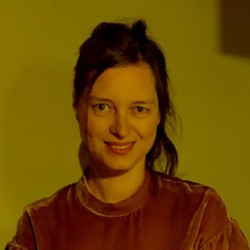 Mariana Lanari (BR/NL) is a performance artist and PhD candidate at the Amsterdam School for Heritage, Memory and Material Culture at University of Amsterdam. She co-founded Archival Consciousness with Remco van Bladel. She is part of the band Rainbowpeel 475.13. She is in the advisory board of De Appel Mobile Archive and of DAAP – Digital Archive of Artist Publishing (UK). She is a member of ARIAS, Amsterdam Research Institute of the Arts and Sciences, and Making Things Public at the lectoraat of the Gerrit Rietveld Academy. Her work has been shown at the Stedelijk Museum Amsterdam, Van Zijl Langhout Gallery, Arti Amititae, W139, Van Abbemuseum, Transmission Gallery (Glasgow), Casa do Povo (São Paulo), among others.
Mariana Lanari (BR/NL) is a performance artist and PhD candidate at the Amsterdam School for Heritage, Memory and Material Culture at University of Amsterdam. She co-founded Archival Consciousness with Remco van Bladel. She is part of the band Rainbowpeel 475.13. She is in the advisory board of De Appel Mobile Archive and of DAAP – Digital Archive of Artist Publishing (UK). She is a member of ARIAS, Amsterdam Research Institute of the Arts and Sciences, and Making Things Public at the lectoraat of the Gerrit Rietveld Academy. Her work has been shown at the Stedelijk Museum Amsterdam, Van Zijl Langhout Gallery, Arti Amititae, W139, Van Abbemuseum, Transmission Gallery (Glasgow), Casa do Povo (São Paulo), among others. 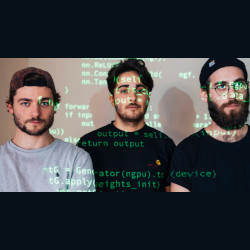 Obvious (FR) is a collective of researchers and artists created in 2018. Their work revolves around generative art, and the use of algorithms for art creation. They created the first AI artwork to go through a major auction house in 2018. Edmond de Belamy sold at Christie’s for nearly half a million dollars. They are also the first French artists to have minted NFTs. Their work explores augmented creativity, and questions on the use of technology in our society.
Obvious (FR) is a collective of researchers and artists created in 2018. Their work revolves around generative art, and the use of algorithms for art creation. They created the first AI artwork to go through a major auction house in 2018. Edmond de Belamy sold at Christie’s for nearly half a million dollars. They are also the first French artists to have minted NFTs. Their work explores augmented creativity, and questions on the use of technology in our society.Credits
STARTS Talk: In Conversation with Territorial Agency
Data Deep Dive: On visualizing critical challenges
These events have received funding from the European Union’s Horizon 2020 research and innovation programme under grant agreement No 956603.
Creating with Data: From Arts to Entrepreneurship
MediaFutures has received funding from the European Union’s Horizon 2020 research and innovation programme under grant agreement No 951962.
